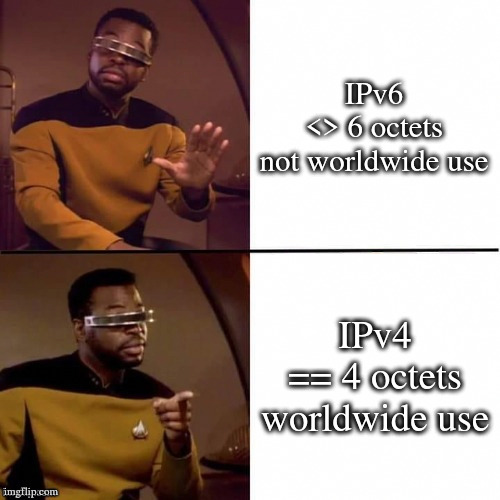this post was submitted on 19 Jun 2024
300 points (85.4% liked)
Programmer Humor
18250 readers
1696 users here now
Welcome to Programmer Humor!
This is a place where you can post jokes, memes, humor, etc. related to programming!
For sharing awful code theres also Programming Horror.
Rules
- Keep content in english
- No advertisements
- Posts must be related to programming or programmer topics
founded 1 year ago
MODERATORS
you are viewing a single comment's thread
view the rest of the comments
view the rest of the comments

I felt dirty! and broke so much shit when i had to implement NAT on networks in the mid 90's. Nowdays with ipv6 and getting rid of NAT is much more liberating. The difference is staggering!
Now the greatest and best effect of ipv6 is none of the above. It is that with ipv6 we have a slim hope of reclaiming some of what made the Internet GREAT in the first place. When we all stood on equal footing. Anyone could host their own service. Now we are all vassals of the large companies that have made the common person into a CGNAT4444 using consumer mindlessly lapping up what the large company providers sees fit to provide us. with no way to even try to be a real and true part of the Internet. Fight the companies that want to make you a eyeball in their statistic, Set up your own IPv6 service on the Internet today !
If all that is true, then why do I still hate ipv6 so much.
For me is because it’s so fucking slow. As soon as I disable ipv6 on every device it has better speeds.
IPv6 is trash.
Lol that's ridiculous. There's nothing about ipv6 that'd make it any slower
There's one practical thing. Routers have had years to optimize IPv4 routing, which has to be redone for IPv6. Same with networking stacks in general.
In theory, IPv6 should be faster by not having to do bullshit like CGNAT. There's every reason to think it'll match that advantage if we just make it happen.
In the USA, around 50% of Google traffic and 60% of Facebook traffic goes over IPv6. The largest mobile carriers in the US are nearly entirely IPv6-only too (customers don't get an IPv4 address, just an IPv6 one), using 464XLAT to connect to legacy IPv4-only servers. I'm sure we'd know if routing with IPv6 was slower. Google's data actually shows 10ms lower latency over IPv6: https://www.google.com/intl/en/ipv6/statistics.html#tab=per-country-ipv6-adoption
That doesn't make it "trash".